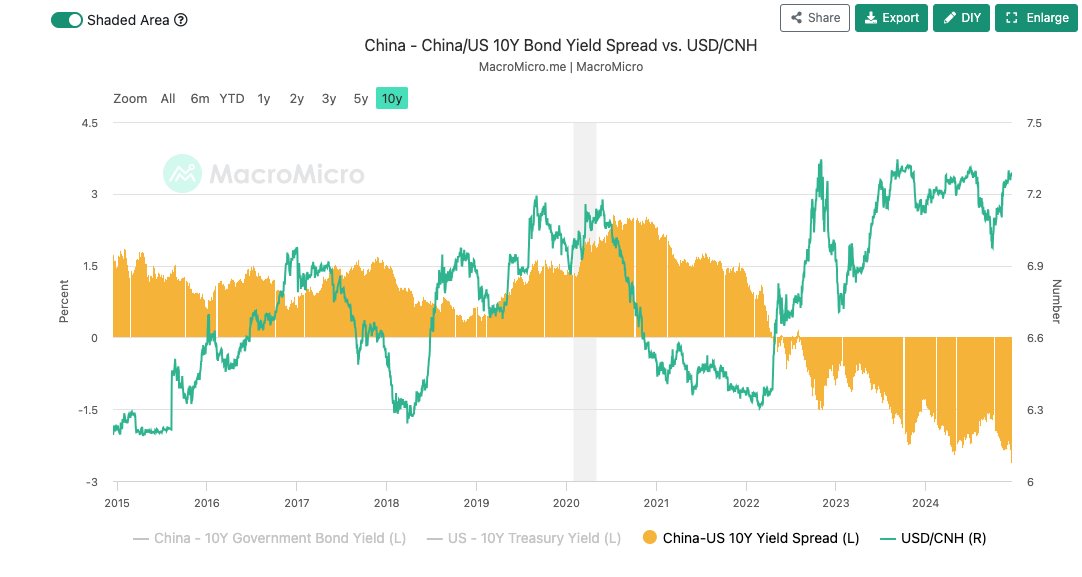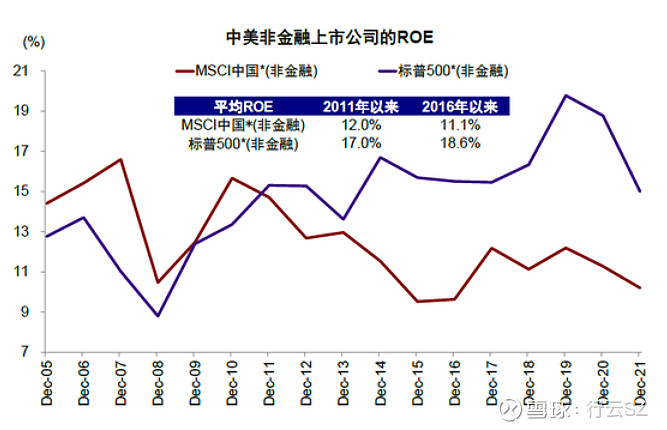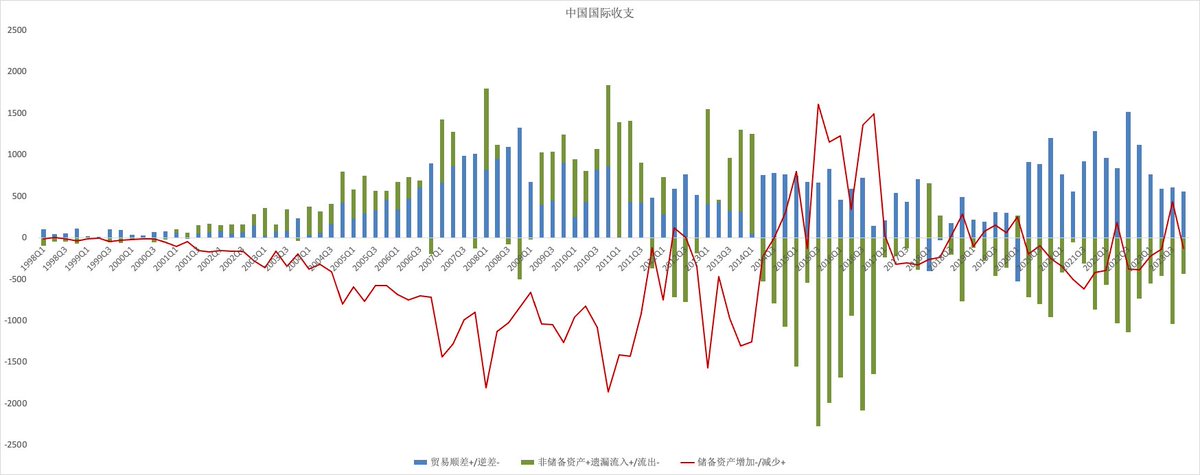Analysis of Investment Return Rates in China
Historically, China's investment return rates have been relatively low, and here we will analyze this issue. Why analyze this? Because it is a "core parameter" that determines the flow of funds at the micro level and the confidence of enterprises…
1 - First, let's discuss whether this is true:
We look at Figure 1: the difference in 10-year government bond yields between China and the U.S. vs. the USD/CNY exchange rate. Before 2022, the yield on Chinese government bonds was higher than that of U.S. bonds, with a yield difference of about 1%-1.5%. During the same period, the USD/CNY exchange rate fluctuated but did not change significantly.
This can be understood as the 1% yield difference compensating for the exchange rate fluctuations and changes between China and the U.S. After all, the major capital in the world is U.S. dollar capital, so we calculate based on the dollar.
After 2022, the U.S. began to raise interest rates, and the yield difference between China and the U.S. turned negative, while the exchange rate also began to rise (the renminbi depreciated). This means that from 2022 to now, holding Chinese government bonds is not profitable, resulting in a double whammy: killing the yield and killing the exchange rate.
Next, we look at corporate return rates, using ROE as an indicator. In Figure 2, we can see that before 2011, the ROE of non-financial enterprises in China and the U.S. was basically the same, but after 2011, a divergence appeared, stabilizing around 2015 with a difference of about 6%.
It is clear that China's investment return rate is lower than that of the U.S., which is a factual statement.
2 - Why is this the case?
There are many reasons from the perspective of corporate analysis. For example, this article from CICC summarizes a few points:
https://finance.sina.com.cn/stock/marketresearch/2022-09-15/doc-imqmmtha7443963.shtml
One reason is the cost of capital; Chinese enterprises tend to borrow from state-owned enterprises.
Then there are tax differences: the corporate income tax rate in China is 25% vs. 15% in the U.S.
Finally, the positioning of industries is different; Chinese enterprises are often in the middle of the smile curve, while the U.S. is at both ends.
But I want to look at it from a different angle, specifically from the perspective of capital abundance.
The logic is simple: in industries with low profit margins, if there are few competitors, high profits can still occur. Conversely, in high-margin industries, like real estate, if there are many competing enterprises, it can turn into a low-margin or even loss-making industry (Evergrande: who are you talking about?).
The impression is that there are many funds and entrepreneurs in China, but the industries available for them to engage in are limited, leading to a situation where there are too many wolves and too little meat. For example, in the past electronic cigarette industry, many companies entered, but very few actually made money. In simple terms, there is too much money.
Here, let’s make an assumption: one reason for the excess money is the high savings rate.
- Reason One: High Savings Rate
The savings rate refers to the percentage of total disposable income that is saved. From the 1980s to 2023, China's household savings rate has remained between 36% and 45%. During the same period, developed countries averaged around 20%, with Germany, Japan, and South Korea around 30%. Among developing countries, Brazil is about 17.4%, and India is about 30.2%; the global average savings rate is around 25%-27%.
So, it is accurate to say that China's savings rate is high.
What impact does a high savings rate have? Savings are money kept in banks. When there is more money saved in banks, it means there is more money available for investment, which also means "too many wolves"… Additionally, saving means less consumption, which leads to a decrease in overall social demand, resulting in "less meat." Therefore, a high savings rate can be considered an important reason for "too many wolves and too little meat, leading to low investment return rates."
By the way, a high savings rate is not entirely a bad thing. It can be said that China's ability to make significant investments in infrastructure in the past is greatly related to the high savings rate. In simple terms, Chinese people do not spend money; they invest it.
Why do people in China save (invest) instead of spending? There are several reasons:
Characteristics of an agrarian civilization, delayed gratification; this is a good thing, saving money for future expenses like retirement and children's education.
Insufficient social welfare; people are reluctant to spend because once money is spent, there is no way to save for retirement…
Lack of places to spend, for example, gambling, drugs, etc.; Thailand allows it, but China does not 😂
Reason Two: Capital Controls:
(The green bar in Figure 3) During 2014-2016, there was a serious "capital outflow," but in 2017, the government closed this loophole. I clearly remember that companies like Wanda and HNA were named at that time. This means that the abundant domestic capital could not be globally allocated… Imagine China's capital pool as a lake connected to the sea by a river, but this outlet is blocked, causing the lake's surface to be higher than the sea level.
By the way, the capital outflow period from 2014-2016 corresponds with the earlier divergence in ROE between China and the U.S.
What would happen if capital outflow were allowed? The result would be a decrease in available domestic capital (fewer wolves), which would alleviate the issue of insufficient return rates. Of course, there are other related issues, such as exchange rate changes, but we won't analyze those here.
In summary, the two reasons can be boiled down to the fact that Chinese people love to save, there is a lot of money, but this money cannot participate in global investments and can only "rot in the pot," circulating in this relatively small domestic market, leading to a decline in investment return rates.
3 - How to Solve This?
Capital controls are a long-term national policy due to safety concerns. Just look at how the Southeast Asian financial crisis abruptly halted the development momentum of those countries. In today's context, where U.S. financial capital and means are clearly superior, implementing certain controls is prudent and not a big issue. I believe the overall trend is towards openness.
Regarding the savings rate issue, here are a few strategies:
The first strategy is for the government to spend on behalf of individuals. For example, increase spending on welfare and people's livelihoods. Where does the money come from? Either through taxation or by increasing the money supply; it's essentially the same thing. To some extent, past infrastructure investments can be seen as the government spending money on behalf of the people, improving urban construction, and providing subways in second-tier cities, which the public can also benefit from.
The second strategy is to learn from the U.S. and create a narrative. How to create a narrative? By enticing and deceiving 😂, telling people that tomorrow will be better and there will be more money. But this is a cognitive battle, and like finance, it is not a common practice.
The third strategy, I believe, is to open up the service industry: reduce some taboos and promote more openness. Of course, it is still necessary to distinguish from the West; for example, drugs cannot be legalized, but cultural industries and financial services can be cautiously opened and managed. However, the opening of these sectors, as well as other service industries, requires a high level of management; the same principle applies: openness must be accompanied by safety.
For a specific example, Chinese people actually spend a lot of money on gambling. Southeast Asia has many gambling industries, which not only diverts this consumption abroad but also leads to a series of issues like kidnappings and organ trafficking due to the weak rule of law there.
For instance, if you open a special zone, similar to Hainan Island, and legalize gambling, you can manage it properly. This could stimulate a significant amount of consumption. There are also online casinos similar to blockchain.



免责声明:本文章仅代表作者个人观点,不代表本平台的立场和观点。本文章仅供信息分享,不构成对任何人的任何投资建议。用户与作者之间的任何争议,与本平台无关。如网页中刊载的文章或图片涉及侵权,请提供相关的权利证明和身份证明发送邮件到support@aicoin.com,本平台相关工作人员将会进行核查。




